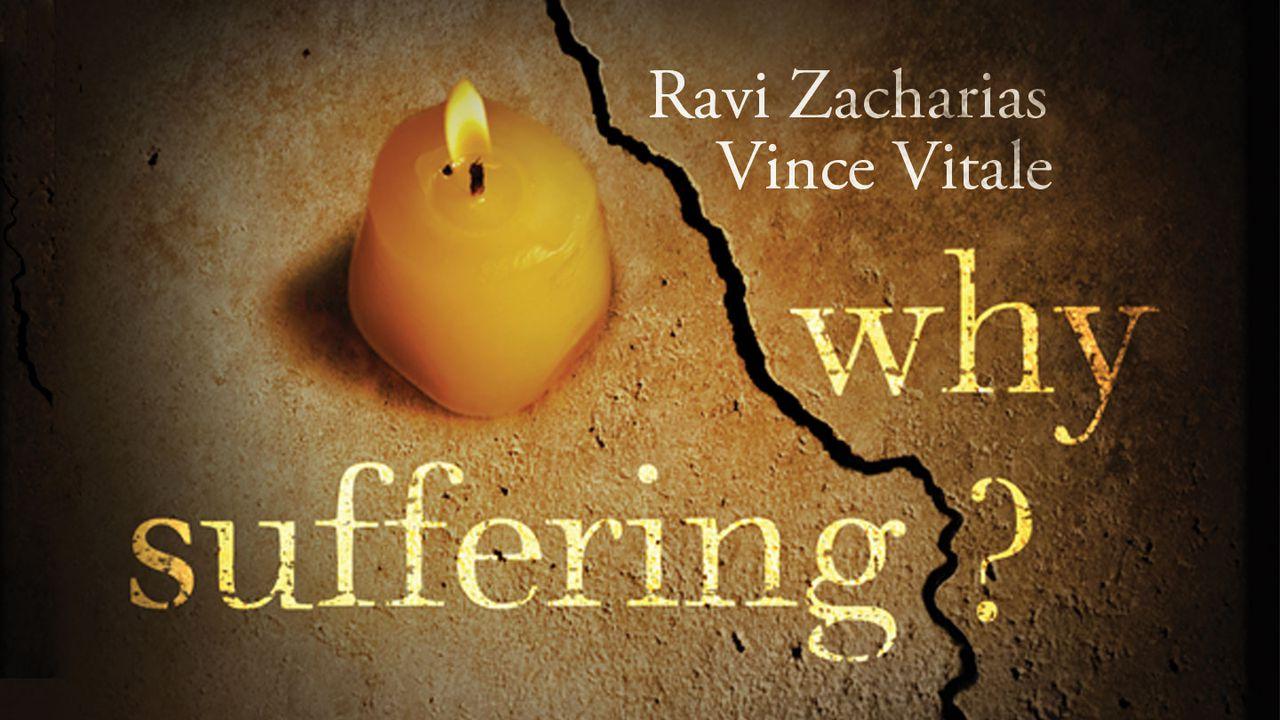Why SufferingMuestra

The Hope of God’s Presence
Malcolm Muggeridge once remarked that “everything that has enhanced and truly enlightened my existence . . . has been through affliction and not through happiness, whether pursued or attained. In other words, if it ever were to be possible to eliminate affliction from our earthly existence . . . the result would not be to make life delectable, but to make it too banal and trivial to be endurable. This, of course, is what the cross signifies.”[1]
We have an Author. We have a story. We have a purpose. We have the breakdown of that purpose. And finally, we have the answer of God’s presence.
Pain can easily produce the sense of being abandoned. The presence of someone who loves and cares can most persuasively counter that fear. God’s words were important to Job in the midst of his suffering, but most important to Job was the assurance that God was with him through it all, revealing Himself to Job at the most critical moment. And Job said, “My ears had heard of you but now my eyes have seen you” (Job 42:5).
Our greatest gift from God is freedom. Our greatest blessing was His presence—perfect love and relationship. On the basis of this follow two converging conclusions.
First, the real malady is within us. The brokenness is in each of us. However, God doesn’t want us to love Him for what we can get from Him. To enable us to cope with suffering, God changes us from within. He changes our hearts and walks with us through the deep waters. This is the greater miracle than the mere changing of circumstances. Only a change within us can keep intact Paul’s three excellencies of faith, hope, and love (1 Cor. 13:13).
Second, the pattern of the story makes sense. The narrative goes from the fact of our brokenness to a Savior who entered into our suffering and brought us the hope of His eternal presence. From the freedom to love, to the possibility of suffering, to the provision of a Savior, to the message of redemption, to our restoration... that is the story of the gospel of Jesus Christ and His redemption provided for you.
Pain holds a legitimate place in our lives. Our problem is not just that we are immoral. Our problem is so severe that it cannot be solved by morality alone. Only the Creator of our souls who gave us our essence can lift us to the plane where we see the Savior’s wounds as our redemption. Jesus Christ continually contradicts us in the way we experience ourselves as alive and shows us how to redefine life.
At times it is necessary to experience pain and suffering if life is to be fully lived and understood. God conquers through it. Maybe this is what the apostle Paul meant when he said, “That I may know him, and the power of his resurrection, and the fellowship of his sufferings, being made conformable unto his death” (Phil. 3:10).
Lazarus’ family at Bethany was very special to Jesus. He was the friend they needed the most when Lazarus was dying, but He wasn’t there. So when He did come, their biggest question was why He hadn’t come before Lazarus died. He assured them that He was indeed the one who could and would still rescue Lazarus. Then with the authority that He alone had, He called Lazarus forth from the grave. The power He had, He displayed. And the sorrow He felt in the face of the death of a friend was not hidden either. Why the tears? Why the heartache? He knew He was going to raise Lazarus from the grave.
To some questions there are answers; to others, there are no answers. Both dissolve in the reality of God’s presence, and the answers we do have about Him carry us through the questions to which we still don’t have the answers. God has made us for that special relationship with Him. That is the purpose of life, that we might know Him and enjoy His presence forever.
Reflection Questions
- Read Malcolm Muggeridge’s quote once more. Based on your own experience, do you agree with his conclusion?
- What do you think Paul means by “the fellowship of his sufferings?”
- For Job, as well as each of us, why is God’s presence so critical when enduring suffering?
Bible Verses
- Psalm 68:18
- Psalm 16:11
- Philippians 3:10
- John 1:1–44
- Job 42
- 1 Corinthians 13:13
Citation
[1] Malcolm Muggeridge, A Twentieth Century Testimony (Nashville: Thomas Nelson, 1978), 27.
Escritura
Acerca de este Plan

This study is based on the book WHY SUFFERING? written by Christian apologist Ravi Zacharias and Vince Vitale, Dean of the Zacharias Institute, It is written for the Christian struggling for an answer, the seeker who thinks suffering disproves God’s existence, and the sufferer who needs a glimpse of a loving God.
More
Planes relacionados

¿Qué Nos Pasó En El Edén?- Psicología De La Caída

El Encuentro Que Transforma

Una Oración Bíblica Por Los Esposos

Eso Tiene Sentido: Una Reflexión Amable Sobre Los Orígenes De La Adicción, Cómo Entenderla Y Cómo Ser Indulgente Consigo Mismo

Salmo 91

Renueva Tu Mente

El Rey Que Se Hizo Siervo

La Compasión Por Encima De La Crítica: Ver La Ansiedad Desde Una Nueva Perspectiva

Un Día a La Vez
